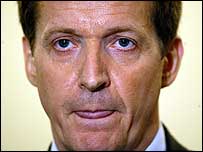No Secret Inquests (at least not yet)
Secret inquests plan is dropped
Tuesday, October 14, 2008
Plans to allow ministers to order inquests to be held in private on security grounds have been dropped.
Ministers withdrew clauses from the Counter-Terrorism Bill which would have allowed the government to remove juries and the press from inquests if it was thought in the public interest.
The government claimed the powers were needed to prevent sensitive information, such as details of phone-taps, falling in to the public domain.
But opponents, such as the families of military personnel killed in battle, said the change could be used to restrict access to important information about how their loved ones died.
There were also warnings it could affect cases like that of Dr David Kelly, the weapons expert who killed himself in 2002 after being identified as the man the government believed was the source for a BBC report on Iraq.
Ministers said they would push ahead with the plans but introduce them in future coroners' court legislation.
A Ministry of Justice spokesman said: 'The House of Commons and House of Lords have expressed a desire to debate the coroners' proposals within the context of wider coronial reform.'
A spokesman for pressure group Inquest welcomed the decision, saying: 'Deaths in custody and those involving issues of national security should be subject to particularly close scrutiny.'
Liberal Democrat Shadow Home Secretary Chris Huhne said: 'It would have been far too convenient for the government to be able to hide a proper and independent inquiry into cases like the death of Jean Charles de Menezes or Dr David Kelly.'
The Tories also welcomed the move. Shadow home secretary Dominic Grieve said: 'The counter-terrorism bill was no place for this controversial measure, which should be in the Coroners Bill.'
http://www.metro.co.uk/news/article.html?Secret_inquests_plan_is_dropped&in_article_
id=356550&in_page_id=34
Tuesday, October 14, 2008
Plans to allow ministers to order inquests to be held in private on security grounds have been dropped.
Ministers withdrew clauses from the Counter-Terrorism Bill which would have allowed the government to remove juries and the press from inquests if it was thought in the public interest.
The government claimed the powers were needed to prevent sensitive information, such as details of phone-taps, falling in to the public domain.
But opponents, such as the families of military personnel killed in battle, said the change could be used to restrict access to important information about how their loved ones died.
There were also warnings it could affect cases like that of Dr David Kelly, the weapons expert who killed himself in 2002 after being identified as the man the government believed was the source for a BBC report on Iraq.
Ministers said they would push ahead with the plans but introduce them in future coroners' court legislation.
A Ministry of Justice spokesman said: 'The House of Commons and House of Lords have expressed a desire to debate the coroners' proposals within the context of wider coronial reform.'
A spokesman for pressure group Inquest welcomed the decision, saying: 'Deaths in custody and those involving issues of national security should be subject to particularly close scrutiny.'
Liberal Democrat Shadow Home Secretary Chris Huhne said: 'It would have been far too convenient for the government to be able to hide a proper and independent inquiry into cases like the death of Jean Charles de Menezes or Dr David Kelly.'
The Tories also welcomed the move. Shadow home secretary Dominic Grieve said: 'The counter-terrorism bill was no place for this controversial measure, which should be in the Coroners Bill.'
http://www.metro.co.uk/news/article.html?Secret_inquests_plan_is_dropped&in_article_
id=356550&in_page_id=34




















